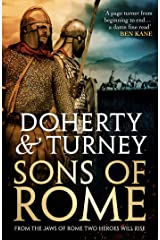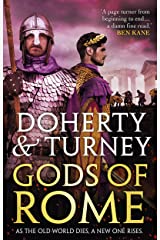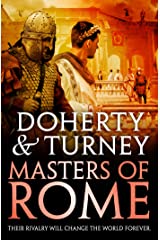
Author of "Legionary" - Buy Link: https://amzn.to/3uXDMoD
Book Blurb:
A tale of military brotherhood in the legions of Rome
The Roman Empire is crumbling, and a shadow looms in the east…
376 AD: the Eastern Roman Empire is alone against the tide of barbarians swelling on her borders. Emperor Valens juggles the paltry border defences to stave off invasion from the Goths north of the Danube. Meanwhile, in Constantinople, a pact between faith and politics spawns a lethal plot that will bring the dark and massive hordes from the east crashing down on these struggling borders.
The fates conspire to see Numerius Vitellius Pavo, enslaved as a boy after the death of his legionary father, thrust into the limitanei, the border legions, just before they are sent to recapture the long-lost eastern Kingdom of Bosporus. He is cast into the jaws of this plot, so twisted that the survival of the entire Roman world hangs in the balance…

Author Bio:
Gordon is a Scottish writer, addicted to reading and writing historical fiction. His novels have been Amazon smash-hits, and have gone on to be translated and published in Russia, Italy and Greece.
Gordon's love of history was first kindled by visits to the misty Roman ruins of Britain and the sun-baked antiquities of Turkey and Greece. His expeditions since have taken him all over the world and back and forth through time (metaphorically, at least), allowing him to write tales of the later Roman Empire, Byzantium, Classical Greece and even the distant Bronze Age.
For exciting news, extracts and exclusive content from Gordon:
Visit www.gordondoherty.co.uk
Follow him on Twitter @GordonDoherty
Follow his author page on www.facebook.com/gordon.doherty
Subscribe to his YouTube channel: www.youtube.com/c/GordonDohertyAuthor

Book Blurb:
360 AD: A Roman legion is trapped and surrounded in the blistering Persian desert... and a great saga begins.
"Eagles in the Desert was intense and ominous - a fast paced, gory battle tale centred around fathers and sons." - Historical Writers' Association Magazine
By trying this book you'll be making a difference -
100% of the proceeds from this short story will go to the blood cancer charity Myeloma UK https://www.myeloma.org.uk/
Book Buy Link: https://amzn.to/3Bq8OGT
Author Interview:
What literary pilgrimages have you gone on?
I give you, ‘The Great Hittite Trail’!
This was our last jaunt abroad before the pandemic hit. What an epic
overland adventure it was, taking in Istanbul, Ankara, Erzurum, Tbilisi and
more. This took us right through the spine of what was, 3,000 years ago, the
heart of the Hittite Empire, and really grounded me for my Hittite series
‘Empires of Bronze.’
The Empires of Bronze series:
A few years before that, I hired a car in Istanbul and ventured northwest
towards the Turkish-Bulgarian border, in search of the site of the famous Battle of
Adrianople – crucial to my ‘Legionary’ series. Read all about it here:
The Legionary series: https://www.gordondoherty.co.uk/legionary.html
2. Tell us the best writing tip you can think of, something that
helps you.
“The first draft of everything is shit”, is a quote attributed to Ernest
Hemingway. I can confirm that my first drafts certainly are...
But that’s the point – they give you something to work with and make
better. Just as Michelangelo needed a brutish block of marble in order to
create David!
I now refer to my first drafts as “The vomit draft”. Just let it all come out
onto the page, rattle on through it, don’t get sidelined by intricate
historical detail (just leave a comment or highlight at that point and you
can come back to it later). So that’s my tip: vomit!
3. What are common traps for aspiring writers? Advice for young
writers starting out.
Overreaching is one common pitfall. You don’t need to start with a Great
American Novel. Start bite-sized, with flash fiction (just a paragraph or a
page in length). It is a rapid and very powerful way to understand and tame
the raw emotions that come out when you first try to write.
4. If you could tell your younger writing self anything, what would
it be?
Be yourself. In the early days, I tried too hard to imitate the authors I liked.
It was fun, but it wasn’t authentic. My wife (chief editor!) showed me this,
and it changed entirely how I approached things. I am still definitely
influenced by other authors, but I always tell my stories my way.
5. What other authors are you friends with, and how do they help
you become a better writer
Writing is such a solitary profession that friends become essential. I’ve met
too many wonderful, supportive people to mention them all here, but take
a look on my Facebook author page:
…where I run weekly charity auctions (for signed rare editions of historical
fiction novels) – just about everybody in the HistFic community has helped
me out with this, and that is simply awesome! If any authors out there
would like to feature their work in my auctions, just drop me a line at:
Specifically though, I have to shout out to my pal Simon Turney. We met in
the mid 2000s when we were both trying to get started with our writing
careers. We have been critiquing each other’s stuff and bouncing ideas
between each other… as well as drinking a fair few pubs dry, ever since. The
high point of the friendship – so far – has to be our recently-released
trilogy ‘Rise of Emperors’ where we tell the story of Constantine the Great’s
Rise to power and his famous battles with his mighty rival, Maxentius.
Rise of Emperors trilogy:
6. Can you give us a quick review of a favourite book by one of your
author friends?
Here’s my review of ‘Clash of Empries’ by my talented friend Paul Bennett:
“The French Indian War, you say? Well, it was virgin territory for me. Aside from what I
had garnered from the Hollywood epic, Last of the Mohicans, I knew very little about the
political and military situation in 1750s colonial America. Now, I feel both educated and
thoroughly entertained by Mr. Bennett’s debut novel ‘Clash of Empires’.
It’s quite a special skill to be able to take a reader (like me) from a dreary morning in a
coffee shop in Scotland and catapult them back through time into the hardships and
wonders of a long-past era. But within a few pages I was there with the book’s hero, Liam
Mallory, edging through snow on my belly, tracking deer. Soon after I was sitting around
the fire with the rest of the Mallory family and their close friends as they enjoyed Liam’s
catch along with a fair dose of home-brewed ale. Bennet paints an intimate picture of a
very real family life in the era, and the excitement builds as they discuss their plans: to
move to a new trading post in the western frontiers. A bold move indeed, given the
dangers of that untamed and much-coveted land.
The story moves at a fair old pace, never sagging nor over-egging any one event. The
Mallory clan and their cadre travel to their new home, literally and metaphorically
arriving right in the lines of fire between the forces of Britain and France, each power at
this point striving to claim the new world as their own. And the European behemoths are
not the only factions vying to shape their own fortunes. The Native American tribes –
proud people and fierce, ruthless warriors – sense that their destiny is being stolen from
them. Most tribes carefully choose to ally with one of the great powers, though some
decide on an alternative path…
And it is here that the Mallory family become truly entwined in events. Our hero, Liam,
finds himself befriended by the people of a Mohawk village and soon loves them as he
does his blood-kin, even taking a Mohawk wife. But the less accepting tribes soon
descend and shatter Liam and his family's new life. Bennet writes gruesome scenes as
well as he does touching ones, and without giving away any detail, I’ll say that his
descriptive of what happens to Liam’s loved ones was harrowing, frank and quite
unsettling.
And so Liam is drawn into the war. What follows is relentless, real and human. Rich in
detail mined from the author’s clearly painstaking research, we find lessons that should
have been learned from the distant past rising to the fore once more; cannons boom,
bullets fly and tomahawks spin through the air as the war builds towards a brutal climax.
A fresh voice and a cracking tale. Recommended!”
Clash of Empires - https://www.goodreads.com/book/show/33143407-
7. How did publishing your first book change your process of writing?
I was overwhelmed (in a positive way) by the amount of kind words coming
in from readers of my first novel ‘Legionary’, and the same question always
followed: ‘when is book 2 coming out?’
It was at this point that I realised I was at least passable as a writer. It made
me realise that I couldn’t rely on the trial and error approach that I took
with Legionary – the writing, redrafting, experimenting of which took
nearly 5 years! Thus, I tried to avoid the things that sapped precious time
from my writing sessions (I was still working full time at this point, so this
meant evenings and weekends were all I had to write my stories). I set up a
proper project workspace on my PC, consolidated my research into quick-
reference documents, and planned out the rest of the series, so I was
marching as opposed to wandering.
The Legionary series: https://www.gordondoherty.co.uk/legionary.html

8. What was the best money you ever spent as a writer?
Pro cover design. This is hardly a new piece of advice, but it is a brilliant
one. I launched Legionary with my own, hand-rolled cover, which was…
er… a valiant effort. But by paying a few hundred pounds to a pro designer,
I tripled my sales overnight, and the Legionary series really kicked on from
there. Check out the before and after:
More Visual Cover Designers: https://bookartwork.com/

9. What was an early experience where you learned that language
had power?
I learned this from reading. I recall vividly and with great pleasure (absurd,
given the circumstances) the few weeks of my childhood when I was off sick
from school with chicken pox. I spent that time in bed, ploughing through
the Chronicles of Narnia. I had never experienced such a level of escapism.
By a certain point, Narnia was real, while the world of my bedroom, school
and the humdrum day to day stuff seemed like little more that some murky
fable. Escapism has helped me massively over the years ever since – and
now I can get to that place by reading or writing.
10. What’s the best way to market your books?
I’m still working on that, to be honest! For the first few years of my writing
career, I did very little marketing. Maybe an email to my subscriber list on
launch day, and a post across the usual social media suspects. It’s only in
recent times when competition is fierce and widespread that I’ve realised I
need to train myself in a little more active marketing. I’m currently working
on Amazon and Facebook ads. Quite daunting at first, but as always it’s
enjoyable when you feel yourself gliding up the learning curve.
11. What kind of research do you do, and how long do you spend
researching before beginning a book?
I’m primarily an armchair researcher. Give me my writing room sofa, a cup
of coffee, my Kindle, a pile of books and my cat and I’m happy as larry.
But… you simply can’t beat a research jaunt! As per my link, above, I took a
trip across central and eastern turkey and up through the Caucasus
Mountains and through Georgia as part of my research for my Hittite
Empire series ‘Empires of Bronze’. This was utterly unforgettable. Meeting
locals, playing with the kids in the villages near the ruins of Hattusa (the
old Hittite capital in central Turkey), smoking shisha pipes and drinking
beer beside the ruins of the Byzantine Emperor’s palace in Istanbul… I’m
sighing fondly as I write this.
How long do I spend? It depends. For the first book in a series I tend to set
aside a few months to really immerse myself in the period. And that usually
follows several years of on/off casual research to see if it’s the project for
me. For subsequent books in a series, it requires a bit less research time –
it’s more slipping into a familiar pair of boots.
The Empires of Bronze series:
12. Have you read anything that made you think differently about
fiction?
Albert Camus once said “People can think only in images. If you want to be
a philosopher, write novels.” I realised the truth of this around the time of
completing my first book. Deeply personal things were coming out in the
story, sometimes as metaphors, sometimes directly. It wasn’t all about
marching, war and adventure. It was about questioning life’s paradoxes,
about understanding the flawed, nuance nature of people. I’m quite into
Stoicism these days, and that tends to come through in my more recent
books.
13. What are the ethics of writing about historical figures?
It is virtually impossible to be absolutely truthful and faithful about
someone who lived and died thousands of years ago when all we have to
tell their story is some agenda-laden panegyric or an invective on which to
go on. More, I’m a writer of historical fiction. Thus, I’m absolutely prepared
to warp history – be it people, places, dates and events – purely to
strengthen the storyline… but only with an accompanying explanation in
the author’s note.
14. Do you read your book reviews? How do you deal with bad or
good ones?
Course I do! Anyone who says they don’t is fibbing
I’m human, so initially, the good ones made me ecstatic and the bad ones
made me grumble. More recently – taking the Stoic approach – I just let it
all glide past me. You can’t please everyone all of the time, and you’d be a
fool to try.
15. What is the most difficult part of your artistic process?
I wouldn’t say the most difficult… but maybe the most ethereal part of it is
the development of themes and characters. I can, and always do, sketch
these things out as part of my planning. A character sheet for every
protagonist, a list of themes and how they might tie in with the plot.
But it never, ever pans out that way. The characters emerge in their true
form during the writing, not before. The real themes smack you right in the
face and make you realise that they’ve probably been lurking in your sub-
conscious for an age. For example, while writing my sixth Empires of
Bronze novel recently, I found myself describing a dangerous wave of
populism sweeping like wildfire across ancient Anatolia. It’s not surprising
that this came through really, given the way the modern world has gone in
the last decade.
16. Tell us about your novel/novels/or series and why you wrote
about this topic?
The Legionary Series is set in the late 4 th century AD in the Eastern
Roman Empire. It is the time of the ‘Great Migration’, when the Huns
began to rumble towards Europe, pushing countless ancient tribes towards
the Roman borders. It is a story about military ethics in an age of great
upheaval (and it’s – hopefully – an absolute rollercoaster of an adventure
too!).
I chose this setting because I am naturally intrigued by periods of change,
particularly the end of eras of stability.
The Legionary Series – https://www.gordondoherty.co.uk/legionary.html
The Strategos Trilogy is set in medieval Byzantium, at the time of the
Byzantine-Seljuk wars. Apion is a product of his time – a Byzantine boy
whose parents die in a Seljuk night raid, and who is subsequently taken
under the wing of a kindly Seljuk farmer. He grows up in the borderlands
between the two great empires, experiencing the growing tensions between
the two powers. When war breaks out, he is drawn into the fray… in search
of the truth about what happened to his parents.
I chose this setting because it is again a pivotal point in history – right on
the edge of Byzantium’s decline. I wanted to write about this place and
period because I spent my youth growing up in western Scotland, a place
scarred by long-standing sectarian tensions.
The Strategos Trilogy - https://www.gordondoherty.co.uk/strategos.html
The Empires of Bronze Series is set in 1300 BC, in the last stretch of the
Bronze Age. Like most of my books – it is set in Anatolia (I simply love the
place) – and centres on the Hittite Empire. The Hittites were supreme in
those days, matched only by Pharaoh Ramesses and his Egyptian Empire.
Yet less than 100 years later, the Hittites would be gone – forgotten to
history for almost 3,000 years. Why? Well this series tells the tale – of the
famous ancient Battle of Kadesh, of the Trojan War, and of the apocalyptic
Bronze Age Collapse.
I chose this setting again because it it’s importance to history. After the
Bronze Age collapsed, the near east world fell into a centuries long dark age
where literacy vanished and the trade networks shrunk away to almost
nothing. I simply had to understand why!
The Empires of Bronze Series -
The Rise of Emperors Trilogy (co-written with Simon Turney) is set in
the late 3 rd and early 4 th century AD. It is written in a semi-epistolary
format, with each chapter being told in turn by Constantine the Great, and
his childhood friend Maxentius. The friendship does not last, as both men
are propelled towards the same imperial throne. For one to rule… the other
must die.
Simon and I chose this setting because it suited us both perfectly. My
expertise lay in the later Roman Empire, and his in the earlier period. So
the time of Constantine – often considered a bridge between the two eras –
was an ideal meeting point for us.
The Rise of Emperors Trilogy -
17. What is your favourite line or passage from your own book?
‘The End’… only kidding!
There’s always a ‘shiver’ line in each book. Some of them don’t stand the
test of time, however. Here’s one I like from my most recent volume
‘Empires of Bronze: The Shadow of Troy’. The Greek hero Achilles, having
just slain Prince Hektor in revenge for the killing of his close companion,
Patroklos, has stripped the dead Trojan prince naked and tied him by the
ankles to the back of his chariot. He then proceeds to race up and down
before Troy’s walls – atop which Hektor’s distraught family stand, watching
on – dragging the corpse in his wake.
I have Hattu – King of the Hittites – intercept Achilles at a blind spot. He
tries to persuade Achilles to end the gruesome parade with the following
line:
“That is but a rotting shell you drag behind your war-car. You can pull it
around all day, but it will never blush or weep or beg for mercy. The only man I
see suffering here is you, Achilles.”
Empires of Bronze: The Shadow of Troy – http://getbook.at/eob5
18. What was your hardest scene to write?
The death of one of the key players in Legionary cut me to my marrow. I
won’t give away names in case anyone wants to read it without spoilers, but
this guy was the father figure in the series. I had a complex relationship
with my own father, and only recently lost him. There was a lot of me and
him in that writing.
19. Tell us your favourite quote and how the quote tells us
something about you.
Sometimes I need something to ground me, to keep me calm. This, from my
literary hero David Gemmell, works every time:
"All things in the world are created for Man, yet all have two purposes. The
waters run that we might drink of them, but they are also symbols of the futility
of Man. They reflect our lives in rushing beauty, birthed in the purity of
mountains. As babes they babble and run, gushing and growing as they mature
into strong young rivers. Then they widen and slow until at last they meander,
like old men, to join with the sea. And like the souls of men in the Nethervoid,
they mix and mingle until the sun lifts them again as raindrops to fall upon the
mountains." - David Gemmell, The King Beyond the Gate
A few of his other books!!













コメント